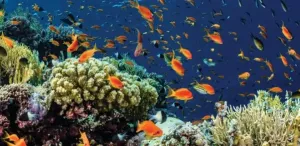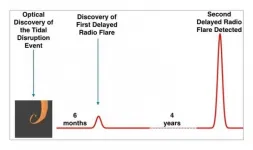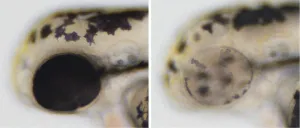Microbiome boost may help corals resist bleaching
2021-02-23
(Press-News.org) A simple but powerful idea is to improve the health of corals using cocktails of beneficial bacteria. The strategy is being explored as part of global scientific efforts to help corals become stronger, more stress resistant and more likely to survive bleaching events associated with climate change.
Corals rely on bacterial and algal symbionts to provide nutrients, energy (through photosynthesis), toxin regulation and protection against pathogenic attacks. This complex and finely balanced relationship underpins the health of the holobiont and coral reefs as a whole.
Rather like the use of probiotics in plant science to improve growth and resilience, marine scientist Raquel Peixoto believes that, in times of stress, corals could benefit from a boost to their natural symbiotic partners.
"This is not the solution to the destruction of our coral reefs; the best solution lies in worldwide CO2 mitigation," says Peixoto, who joined KAUST in 2020 from the Federal University of Rio de Janeiro, Brazil. "But we're hopeful that we can buy corals some time by using beneficial microorganisms for corals (or BMCs) and providing a 'medicine' to help them better cope with shifting environmental pressures and adapt to a changing world."
Peixoto has previously conducted lab-based experiments trialing BMCs in collaboration with KAUST researchers and is continuing her groundbreaking research now she is based on campus.
"It is exciting to work right beside the Red Sea, which is arguably the best source of powerful coral probiotics on Earth," says Peixoto. "These reefs have adapted to higher temperatures and salinity than other regions, providing an ideal model for stress-tolerant corals and bacteria."
To ensure BMCs are safe, Peixoto and her team select bacteria that are naturally symbiotic to specific coral species on each reef, ensuring no alien bacteria are accidentally introduced. Peixoto is encouraged by their lab-based results so far, including one study that involved inoculating a single coral species with a BMC consortium comprising six bacteria strains. The coral's microbiome underwent dynamic genetic and metabolic alterations that boosted its chances of survival under heat stress.
"As well as further proof of concept of BMCs, this provides us with a fantastic model of host-microbiome interactions, demonstrating just how intimate the relationships are," says Peixoto.
Success in the lab, however, needs to translate to success in the open oceans, which requires innovative multidisciplinary research. Scaling up and seeding whole reefs might involve robots and artificial intelligence (AI), for example, which could deliver probiotics either into sediments or directly to corals. Slow-release "pills" could disseminate the probiotic consortia in the right place at the right time. "Bleaching events can be predicted," notes Peixoto, "so specific regions could be targeted for a month or two ahead of time to boost coral health."
The KAUST team is also considering the feasibility to create "universal" BMC consortia that would be effective for whole reefs. They are currently working with five common coral species from an offshore reef near KAUST. They will test the corals with a specific BMC consortium for each species but will also test their response to a universal consortium.
"Ultimately, we may need to develop several consortia targeting the majority of species in a reef," says Peixoto. "If we have to pick, we'll choose those corals that most need our help."
INFORMATION:
[Attachments] See images for this press release:

ELSE PRESS RELEASES FROM THIS DATE:
2021-02-23
Members of the German Bundestag who belong to underrepresented groups are more active in the legislative process and, early on, typically tend to advocate more for the interests of their groups. However, a current study by the universities in Konstanz, Basel, Geneva and Stuttgart indicates that, after a few years, most of them do move on to other political fields. This is tied to the career-related incentives these elected representatives face: At first, their careers in parliament benefit from their ability to speak for underrepresented groups. As their careers progress, however, they are required to demonstrate expertise in areas beyond the interests of these groups, the researchers conclude.
The study was led by Professor Christian Breunig, ...
2021-02-23
Low-income families have a high awareness of healthy diets but can't afford good quality and nutritious food, new research shows.
The University of York study, in partnership with N8Agrifood, showed that participants tried to eat as much fruit and vegetables as they could within financial constraints, avoiding processed food wherever possible. But there was widespread acknowledgement that processed food was often more accessible than healthy options because of its lower cost.
The researchers said that while the diets of low-income households have been subject ...
2021-02-23
Whether it's a "Zoombomb" filled with racial slurs, a racist meme that pops up in a Facebook timeline, or a hate-filled comment on an Instagram post, social media has the power to bring out the worst of the worst.
For college students of color who encounter online racism, the effect of racialized aggressions and assaults reaches far beyond any single social media feed and can lead to real and significant mental health impacts - even more significant than in-person experiences of racial discrimination, according to a recently published study from researchers at UConn and Boston College.
"I think we all suspected that we would find a relationship between the racism online in social media and student mental health," says lead author Adam McCready, an assistant professor-in-residence ...
2021-02-23
A team of researchers from the Hebrew University of Jerusalem (HUJI) led by Dr. Assaf Horesh have discovered the first evidence of radio flares emitted only long after a star is destroyed by a black hole. Published in the periodical Nature Astronomy, the discovery relied upon ultra-powerful radio telescopes to study these catastrophic cosmic events in distant galaxies called Tidal Disruption Events (TDE). While researchers had known that these events cause the release of radio flares, this latest discovery saw those flares being emitted months or even years after the stellar disruption. The team was led by Dr. Horesh from the Racah Institute of Physics at the Hebrew together with the NASA Swift space telescope director Professor Brad Cenko and Dr. Iair ...
2021-02-23
Selenium contamination of freshwater ecosystems is an ongoing environmental health problem around the world. A naturally occurring trace element, selenium levels are high in some geologic formations like sedimentary shales that form much of the bedrock in the Western United States. Soils derived from this bedrock, and weathering of shale outcrops, can contribute high levels of selenium to surrounding watersheds.
New research out today in Environmental Science & Technology from UConn Assistant Professor of Natural Resources and the Environment Jessica Brandt with Travis Schmidt and colleagues at the United States Geological Survey (USGS) investigates some of the complexities of selenium and how it moves through the ecosystem during runoff ...
2021-02-23
To discover the function of a gene researchers turn it off and observe the consequences. Often genes have multiple functions that differ depending on a tissue and age. Some genes are essential to growth and turning them off too early can have profound consequences that can make observing other functions impossible. To avoid it, researchers have been using conditional gene inactivation which allows turning a gene off only in a specific tissue or later in development, e.g., in adulthood.
One of the systems used for conditional gene inactivation is Cre/lox. "It is the gold standard for the conditional gene inactivation in mice but over time has also become quite important in other model ...
2021-02-23
New storage and information technology requires new higher performance materials. One of these materials is yttrium iron garnet, which has special magnetic properties. Thanks to a new process, it can now be transferred to any material. Developed by physicists at Martin Luther University Halle-Wittenberg (MLU), the method could advance the production of smaller, faster and more energy-efficient components for data storage and information processing. The physicists have published their results in the journal "Applied Physics Letters".
Magnetic materials play a major role in the development of ...
2021-02-23
The way a fish swims reveals a lot about its personality, say scientists
Personality has been described in all sorts of animal species, from ants to apes. Some individuals are shy and sedentary, while others are bold and active. Now a new study published in Ecology and Evolution has revealed that the way a fish swims tells us a lot about its personality.
This new research suggests experts can reliably measure animal personality simply from the way individual animals move, a type of micropersonality trait, and that the method could be used to help scientists understand about personality differences in wild animals.
A team of biologists and mathematicians from Swansea University and the University of Essex filmed the movements of 15 three-spined stickleback ...
2021-02-23
A new analysis of B cells and more than 1,000 different monoclonal antibodies from 8 patients with COVID-19 shows that, contrary to previous hypotheses, protective B cell responses to the SARS-CoV-2 spike protein remain stable and continue to evolve over a 5-month period, many months after the initial period of active viral replication. However, a large proportion of the neutralizing antibodies generated from these long-lasting B cells did not efficiently recognize various emerging SARS-CoV-2 variants from Brazil and South Africa. These results - from an academia-industry collaboration - will help inform the design of future COVID-19 vaccines that work to constrain viral evolution and stimulate ...
2021-02-23
Researchers have pinpointed a helper T cell population in the lungs of patients with severe COVID-19 that may be central to the development of hyperinflammation, lung injury, and subsequent acute respiratory distress syndrome (ARDS) during disease. Their data support the ongoing investigation of anti-cytokine therapies that target this cell subset, called tissue-resident memory-like Th17 cells (Trm17). To date, the bulk of research on immune responses to COVID-19 has mainly focused on T cells in the blood, while the role of tissue-specific immune cells in the inflamed lung has remained unclear. Accumulating evidence suggests that one of the causes of ...
LAST 30 PRESS RELEASES:
[Press-News.org] Microbiome boost may help corals resist bleaching



